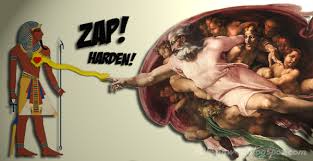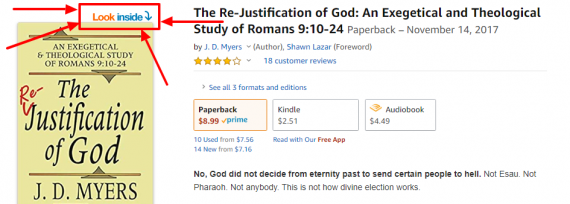In a previous post I introduced the concept of what the Bible means when it talks about election. You will want to go read that post, or listen to the podcast, before you read this post, as it forms the foundation for the ideas presented below.
And if you really want to learn more about what I discuss in this article, you will want to get my book,(#AmazonAdLink) The Re-Justification of God. It provides more information about how to understand Romans 9:10-24. (And yes, I know the title is strange and the cover is boring, but you can find out the reason for WHY by using the “Look inside” feature at Amazon. This will allow you to read the Author’s Note and the Preface to the book, which explains more.)
Here are the texts about election from Romans 9 that we want to briefly consider here:
And not only this, but when Rebecca also had conceived by one man, even by our father Isaac (for the children not yet being born, nor having done any good or evil, that the purpose of God according to election might stand, not of works but of Him who calls), it was said to her, “The older shall serve the younger” (Romans 9:11-12).
For the Scripture says to the Pharaoh, “For this very purpose I have raised you up, that I may show My power in you, and that My name may be declared in all the earth” (Romans 9:17).
Does not the potter have power over the clay, from the same lump to make one vessel for honor and another for dishonor? What if God, wanting to show … wrath and to make His power known, endured with much longsuffering the vessels of wrath prepared for destruction, and that He might make known the riches of His glory on the vessels of mercy, which He had prepared beforehand for glory, even us whom he called, not of the Jews only, but also of the Gentiles? (Romans 9:21-24).
Brief Overview of Romans (for Context)
It is first of all helpful to recognize the overall message and meaning of the book of Romans.
Despite what some think, Paul’s letter to the Romans is not about justification, or even the righteousness of God. It is not about how great God is or how to go to heaven when we die.
 Instead, Paul’s letter to the Romans is about how the gospel “saves” believers and unbelievers alike (Romans 1:16-17) from wrath. This becomes clearer still when we recall that the word “saves” does not mean “justifies” but “delivers” (see my study on the word ‘saved’) and “wrath” does not mean “go to hell when you die” but refers instead to the devastating and destructive consequences of sin
Instead, Paul’s letter to the Romans is about how the gospel “saves” believers and unbelievers alike (Romans 1:16-17) from wrath. This becomes clearer still when we recall that the word “saves” does not mean “justifies” but “delivers” (see my study on the word ‘saved’) and “wrath” does not mean “go to hell when you die” but refers instead to the devastating and destructive consequences of sin
Paul’s letter to the Romans is about how the gospel not only delivers people from the eternal and spiritual consequences of sin, but also from the temporal and physical consequences.
Romans 9 fits squarely within the second part of this theme.
Up to this point in Romans, Paul has argued that although sin is a universal human problem (Romans 1–3), God has a divine purpose and significance for all believers, so that if we live in light of our justification (Romans 4–5) and walk by faith (Romans 6–7), God will bless us and work with us to accomplish His will on earth (Romans 8).
In the last part of Romans 8, Paul sets out to encourage his readers that nothing can get in God’s way of accomplishing His purposes (Romans 8:28-39).
Yet there is one main problem with Paul’s logic up to this point.
Though Paul says that nothing can get in God’s way of Him accomplishing His purposes in us, the biblical record seems to indicate that something got in the way of God accomplishing His purposes for Israel.
Israel too was God’s elect, but by all appearances, God “set them aside” and turned to the Gentiles instead. So if God’s purposes failed with Israel, how can Paul say that God’s purposes will not fail for the church?
Romans 9–11 contains Paul’s response to this objection.
In Romans 9–11, Paul explains that God’s purposes for Israel did not fail, and for the most part, Israel herself did not fail.
Nevertheless, if we understand what happened to Israel, we will then be better able to protect the church from something similar happening to us.
Jacob and Esau in Romans 9
In the first part of Romans 9, Paul uses three biblical examples to show that God’s election of people and groups is to service.
 The first example is Jacob and Esau, and it is important to note that both Jacob and Esau were elected, or chosen, by God. It is often assumed that only Jacob was chosen by God, but Paul clearly indicates that God chose the older brother, Esau, to serve the younger brother, Jacob.
The first example is Jacob and Esau, and it is important to note that both Jacob and Esau were elected, or chosen, by God. It is often assumed that only Jacob was chosen by God, but Paul clearly indicates that God chose the older brother, Esau, to serve the younger brother, Jacob.
This once again proves that election is to service.
Through the way Paul structures his argument and Old Testament quotations, he indicates that that while Isaac and Jacob were chosen to be recipients of the promise, Ishmael and Esau were still chosen by God, but for other purposes and tasks.
God’s choosing and election in Romans 9 is not to eternal life, but to vocation, mission, purpose, and service.
Esau’s election certainly was a different service than the one to which Jacob was called, but it is clearly a call to service nonetheless.
This call to various forms of service was not only true of the individuals, Esau and Jacob, but also to the nations that came from them, Edom and Israel. Just as Israel was chosen to perform a particular type of service to the world, so also Edom was chosen to perform a particular type of service to Israel.
Therefore, just as Paul is not saying that all Israelites have eternal life, so also, Paul is not saying that all Edomites (the descendants of Esau) are destined for eternal damnation.
The passage is not about eternal destinies at all.
Any Edomite has just as much opportunity to believe and receive eternal life from God as any Israelite. God chose Israel so that they might be a blessing to the surrounding nations, and God chose Esau and the Edomites to help Jacob and Israel in this task.
The Hardening of Pharaoh’s Heart in Romans 9
The same truths are then applied by Paul to why God raised up Pharaoh during the Exodus events.
The way Paul structures his argument in Romans 9:14-18, Paul shows that Pharaoh too was chosen, or elected, by God. But this says nothing about Pharaoh’s eternal destiny.
Romans 9:14-18 is not referring to where Pharaoh will spend eternity.
 Instead, God raised up Pharaoh and solidified the proud and stubborn rebellion that was in Pharaoh’s heart so that those who witnessed and heard of what happened in Egypt would know that the God of Israel alone was God. Could not God, in His gracious sovereignty, do such a thing with Pharaoh without affecting whatsoever Pharaoh’s ability to believe in God’s promises and thus become part of God’s redeemed people?
Instead, God raised up Pharaoh and solidified the proud and stubborn rebellion that was in Pharaoh’s heart so that those who witnessed and heard of what happened in Egypt would know that the God of Israel alone was God. Could not God, in His gracious sovereignty, do such a thing with Pharaoh without affecting whatsoever Pharaoh’s ability to believe in God’s promises and thus become part of God’s redeemed people?
Of course He could!
The hardening of Pharaoh’s heart, whether it is done by God or Pharaoh, or by some symbiotic combination of the two, has absolutely nothing to do with Pharaoh’s eternal destiny.
Even if the Exodus account laid all the responsibility for the hardening of Pharaoh’s heart upon God Himself, and none upon Pharaoh, this still would tell us nothing about whether or not Pharaoh concluded His life as one of God’s redeemed.
Pharaoh’s eternal destiny is not under discussion in Exodus or in Romans, and so Pharaoh’s heart can be hardened so that God’s purposes are achieved, while still leaving plenty of room for Pharaoh to believe in God’s promises and become one of God’s people.
When Pharaoh’s kingdom came crashing down around him through the Ten Plagues and the destruction of his army in the Red Sea, one wonders if Pharaoh learned the lesson God had sought to teach him, and had returned back to his empty throne room where he threw himself upon the mercy of the One True God, recognizing God’s sovereignty and power over all—even over Pharaoh himself.
The Bible does not say this happened, but we can hope.
The Potter and the Clay in Romans 9
Paul uses the image of the potter and the clay from Jeremiah 18 as his third example of how election works. There are numerous interpretive issues with this portion of Paul’s argument, which I explain in more detail in my book, (#AmazonAdLink) The Re-Justification of God. In that book, I propose that the following translation of Romans 9:22-24 best summarizes Paul’s point:
What if God, wanting to reveal wrath for what it is and make His power known, endured with much longsuffering the vessels of dishonor which were headed for destruction, so that He might make known the riches of his glory upon vessels of honor—which is the plan He has prepared beforehand for glory—and He did this not only for the Jews, but also for the Gentiles?
 Read this way, God does not create two classes of people, one to destroy and one to bless. God does not create vessels for dishonor, but instead, endures with patience those who are dishonorable in the hopes that they would see His mercy and become vessels of honor.
Read this way, God does not create two classes of people, one to destroy and one to bless. God does not create vessels for dishonor, but instead, endures with patience those who are dishonorable in the hopes that they would see His mercy and become vessels of honor.
God is longsuffering toward those who are in rebellion so that He can display His grace and mercy to them, with the hope that the vessels headed for destruction might instead become vessels headed for glory.
Either way, God’s creative wisdom enables Him to use honorable vessels for honorable purposes and dishonorable vessels for dishonorable purposes.
Once again, this has nothing whatsoever to do with the eternal destiny of these vessels, but instead concerns their role, function, and purpose within this life.
Romans 9 and Election
So Paul believes that election can be both corporate and individual, and that election is not to eternal life, but to service in this life.
Paul illustrates this teaching on election by pointing to Jacob and Esau and the nations that came from them, the hardening of Pharaoh’s heart, and God’s choice to use both honorable and dishonorable vessels to accomplish His purposes of blessing, reconciling, and redeeming the world.
Romans 9 is not about some strange act of God whereby He chooses some to receive eternal life while others get damned to hell by God’s sovereign eternal decree.
No, the point of Romans 9 is that God sought to bless the entire world by raising up Israel to be a light and a blessing to others. Having completed this task, God did not set Israel aside.
Instead, He transitioned from having an elect group of people in part of the world to calling all people in the world to join Him in the new elect people. So although Israel was elect, she fulfilled her task and became a non-elect nation so that the non-elect world could become elect.
This is what Paul continues to explain in Romans 11 as he answers the objection about how God’s promises and purposes do not fail even if God’s elect people do.
Romans 11 Supports this Reading of Romans 9
Paul returns to discuss election in Romans 11. Here are the pertinent texts:
Even so then, at this present time there is a remnant according to the election of grace (Romans 11:5).
What then? Israel has not obtained what it seeks; but the elect have obtained it, and the rest were blinded (Romans 11:7).
Concerning the gospel they are enemies for your sake, but concerning the election they are beloved for the sake of the fathers (Romans 11:28).
As seen in the discussion above about Romans 9, the entire discussion in this part of Romans is about how God’s promises to the church can be trusted, since God’s promises to Israel seem to have failed.
Since Paul argued near the end of Romans 8 that nothing can separate us from God’s loving plan for us, the natural objection to this is, “But what about Israel? Weren’t they separated from God’s plan due to their sinful rebellion and failure to serve as a blessing to the world?”
Paul’s initial response in Romans 9 is that election is not to eternal life and glorification, but to service in this life.
 Having made this point, Paul goes on to argue in Romans 10 that Israel did not fail, but actually succeeded, and in fact, can continue to be elect by joining the elect people of God in the church. This is why Paul calls the church to proclaim the gospel to the Jews as well.
Having made this point, Paul goes on to argue in Romans 10 that Israel did not fail, but actually succeeded, and in fact, can continue to be elect by joining the elect people of God in the church. This is why Paul calls the church to proclaim the gospel to the Jews as well.
If the church does her job of proclaiming the gospel, any Israelite who believes in Jesus will become elect and join God’s plan and purposes in this world. This is what Paul goes on to describe in Romans 11.
The church has not replaced Israel in God’s plan for the world, but has been grafted in to supplement God’s plan, which, as it turns out, was God’s plan from the very beginning.
Even within Israel as a whole, there is always a remnant of believers who carry on the original task and purpose which God gave to the people of Israel (Romans 11:5). Though most of Israel is blinded, those Israelites who believe in Jesus for eternal life are thus part of the church and elected to participate in God’s purposes for this world (Romans 11:7).
Furthermore, a day is coming when Israel will return to her true calling, thereby bringing about the resurrection of the world (cf. Romans 11:12-15). Though many Israelites are antagonistic to the gospel, they nevertheless continue to serve role in God’s plan, and will do so in the future as well. In this way, though they are “enemies” to the gospel, they are beloved friends regarding election (Romans 11:28).
Note that, once again, nothing in this part of Romans 11 has anything whatsoever to do with people’s eternal destinies.
Paul is not talking about whether or not people can lose their eternal life. He is talking about positions of service in God’s plan for the world. God wants to bless the world, and while He chose Israel for this purpose, He now seeks to do it through the church, until ultimately all will be blessed by God (Rev 21:23-26; 22:2).
Just as God elected Israel to serve His purposes in the world, God chose the church for similar purposes.
God’s election of Israel and the church is not His choice of who will receive eternal life, but His choice of who will serve Him by being a blessing to this world.
Such an understanding helps make sense of some of the notoriously difficult verses in Romans 11. For example, Paul writes in Romans 11:17-21 that the elect branches were cut off so that non-elect branches could be grafted in, which in turn will lead to the elect-which-became-non-elect to be re-grafted back in and become re-elect.
If Paul is referring to eternal life when he speaks of election, none of this makes any sense. How can a people or a nation whom God elected “to eternal life” before the foundation of the world go from being elect to non-elect and then re-elect?
Romans 11:17-21 makes perfect sense, however, when we recognize that election is not to eternal life but to service. God wants to bless the world through His people. Israel accomplished their role in this, which led to the birth of the church.
But this does not mean that the church replaced Israel in God’s plan, but that God grafted Gentiles into His overall plan, and now invites all Israelites to be included in this ongoing plan, just as God invites all Gentiles as well.
 In this way, when Paul writes about branches being cut off so others can be grated in which will lead to the cut off branches being grafted back in again, he is not talking about people losing and regaining eternal life, but about losing and re-gaining places of privilege and purpose in God’s plan for this world. God’s plan of redemption started with Israel, shifted to the church (consisting of both Jewish and Gentile believers), so that “of Him and through Him and to Him are all things” (Romans 11:36).
In this way, when Paul writes about branches being cut off so others can be grated in which will lead to the cut off branches being grafted back in again, he is not talking about people losing and regaining eternal life, but about losing and re-gaining places of privilege and purpose in God’s plan for this world. God’s plan of redemption started with Israel, shifted to the church (consisting of both Jewish and Gentile believers), so that “of Him and through Him and to Him are all things” (Romans 11:36).
Israel, the elect nation, became non-elect once she had completed her task of bringing Scripture, the Messiah, and the elect church into the world.
God now joins believing Gentiles with believing Israelites together to form the church so that as the elect people of God, they will be a blessing to the world.
God’s plan did not fail, but simply transitioned from one group (Israel) to another (the church), so that the second group (the church) could be a blessing to the first (Israel) as well as to the whole world.
Election, Romans 9-11, and the Theme of Romans
This understanding fits perfectly with Paul’s overall theme in Romans about the gospel as the power of God unto salvation for all believers.
Remember, salvation is not about believing in Jesus for eternal life (though that is a central part of the gospel), but is also about living with purpose and significance as members of the new creation in this life.
This is Paul’s message in Romans, and Romans 9–11 fit perfectly into this overall theme. The gospel is good news for all who believe, whether Jew or Gentile.
It tells believers that our God is on the move in and through us; that His plan is moving forward. If we follow Him in faith, we will play a thrilling part in His plan for this world.
 Understanding the Gospel requires us to properly understand the key words and terms of the Gospel. Take my course, "The Gospel Dictionary" to learn about the 52 key words of the Gospel, and hundreds of Bible passages that use these words.
Understanding the Gospel requires us to properly understand the key words and terms of the Gospel. Take my course, "The Gospel Dictionary" to learn about the 52 key words of the Gospel, and hundreds of Bible passages that use these words.
This course costs $297, but when you join the Discipleship group, you can to take the entire course for free.





Thanks for the podcast. It helped to clarify some of what was written. I think it also helped me to go on reading into Romans 12 a bit for me.
I am still hung up a little bit on the election concept, that it is not to eternal destiny, but is to service. Rom 9: vs 23 and 30.
(Using the free logos software’s Lexham English version, the words prepared beforehand for glory. It sounds like God is going to bestow glory onto the ones He elected for it according to his mercy. Why the word mercy? What would an elect person (to service need mercy for?)
Help me understand this better.
In vs 30 it appears the gentiles were people who were not looking for a God encounter, yet it came to them and they had it. Sounds like a good reason for evangelism and Cross Cultural Team Trips. But the Lexham version seems to say that gentiles that did not pursue , but attained righteousness, even the righteousness that is by faith were justified by their faith. That Israel missed the point when they pursue the law for the sake of accomplishing every tittle rather than living and and trusting in God by Faith as Abraham, Jacob, The Faithful Fathers, Isaiah did.
Is this essentially couple verses essnentially laying out a case for why righteousness by faith is effective and righteousness by works is not? Or maybe not why but that it is a fact that one works and one way doesn’t?
It’s good to struggle with the text the way you are. Rom 9:23 is notoriously difficult to translate, which is why there are so many differences. I tried to propose a translation above that sort of explains it…
And yes, I would say that Romans 9:30 is referring to the coming of the Gospel to the Gentiles, which is the gospel of how to receive God’s righteousness by faith. This isn’t election, but is the result of the gospel spreading upon the earth as a result of the work of apostolic missionaries like Paul.
Hello Jeremy, you say “This isn’t election, but is the result of the gospel spreading upon the earth as a result of the work of apostolic missionaries like Paul”.
It’s both. It’s election, and the work of the apostles.
Eph 1:3-6:
3 Blessed be the God and Father of our Lord Jesus Christ, who has blessed us in Christ with every spiritual blessing in the heavenly places, 4 even as he chose us in him before the foundation of the world, that we should be holy and blameless before him. In love 5 he predestined us[b] for adoption to himself as sons through Jesus Christ, according to the purpose of his will, 6 to the praise of his glorious grace, with which he has blessed us in the Beloved.
Christians were chosen by God before the foundation of the world, to the praise of His glorious GRACE (undeserved favor), the same grace that saves us (Eph. 2:8-9). The Bible says that He will return to gather His “elect”….His chosen ones.
Does this mean we don’t need to proclaim the gospel? No, it empowers us to do so.
John 10:16
16 And I have other sheep that are not of this fold. I must bring them also, and they will listen to my voice. So there will be one flock, one shepherd.
Who is doing the “bringing” here? God is…yet, He uses us as instruments to save those around us. Peter, speaking the gospel in Acts, sees the Holy Spirit fall on the gentiles listening. His proclamation brought salvation to those gentiles. Those gentiles “heard the voice of the shepherd (Jesus)” and got saved. Jesus said, “My sheep hear my voice, and they will follow Me”.
Paul says to Christians, – “Work out your own salvation, FOR GOD is working in you…”. We work BECAUSE God works in us.
Romans 9 is both election, AND Paul working to spread the gospel.
I enjoyed your explanations. That has been my view but you have explained some verses clearer. Thanks.
Most of the New Testament is about service. Hence it also speaks of Rewards.
Just like some of Israel did not accept or understand the plan and purposes and promises of God, so too many of the church…saved people don’t understand the matter of service and Rewards.
Just like Israel thought they automatically qualified for all the Kingdom blessings so too the church…believers have been taught that once they are saved (i believe in eternal security of the believer)they automatically qualivy for all the Kingdom blessings of reigning with Christ.
That is one reason the church is becoming like Israel (to go along with they pattern you have explained).
We must press towards the mark for the prize of the high calling in Christ Jesus.
God bless
Thank you for clarifying this troublesome passage! I was livid this morning at the Apostle Paul when he compared humans to clay. We are NOT lumps of clay in that we can learn, choose and change. We have the ability to discern right from wrong! We can know what justice is and is NOT! Come on, Paul, that is a horrid analogy! So, yeah, I calmed down and looked for answers. Thankfully, I came across your site!
Thanks for your message on Election. My pastor has preached that this refers to eternal life which
has placed the biggest burden on my heart since I came to believe. How could a loving God
elect someone to heaven or hell before they are even born? Scripture doesnt support this and what you are saying about it referring to service seems to fit into the entire context of ALL scripture. Praise God for lifting this from my heart !!
How can a people or a nation whom God elected “to eternal life” before the foundation of the world go from being elect to non-elect and then re-elect?
Answer: because salvation is a conditional Covenent based on the Lord’s hesed love, it’s not assured to any of us. we must be faithful to His Covenent, not complacent and defiant towards it and Him.
In Christ,
Andrew
The reason why people get upset with Romans 9 is because it shows that God is in charge, not Man. Those who are born of God knows this stark truth which leads to humility. Rebellious Man relies on sentimental theologians to cast down God’s Word and flatter human pride. It’s popular, but futile, and it confuses basic biblical truths, which is no part of true Bible teaching.
its main aim, developed from the days of Constantine, is to make Christianity a religion. It is, in fact, His revelation.
“He was in the world, and the world was made by him, and the world knew him not. He came unto his own, and his own received him not. But as many as received him, to them gave he power to become the sons of God, even to them that believe on his name: Which were born, not of blood, nor of the will of the flesh, nor of the will of man, but of God.” (John 1:10-13)
“All that the Father giveth me shall come to me; and him that cometh to me I will in no wise cast out. 6:38 For I came down from heaven, not to do mine own will, but the will of him that sent me. And this is the Father’s will which hath sent me, that of all which he hath given me I should lose nothing, but should raise it up again at the last day.” (John 6:37-39)
“No man can come to me, except the Father which hath sent me draw him: and I will raise him up at the last day.” (John 6:44)
Election is to salvation. Service is first and foremost to God, then humans by God’s Will. Man does not choose except in the sense that God enables him . No amount of man-pleasing sentimentality or specious argument can change this, because all Scripture teaches Election.
“Blessed be the God and Father of our Lord Jesus Christ, who hath blessed us with all spiritual blessings in heavenly places in Christ: According as he hath chosen us in him before the foundation of the world, that we should be holy and without blame before him in love:
“Having predestinated us unto the adoption of children by Jesus Christ to himself, according to the good pleasure of his will, To the praise of the glory of his grace, wherein he hath made us accepted in the beloved.” (Eph 1:3-6)
It is all of God. He chooses whom He will awaken to reality, not ourselves.
“But God, who is rich in mercy, for his great love wherewith he loved us, even when we were dead in sins, hath quickened us together with Christ, (by grace ye are saved;) And hath raised us up together, and made us sit together in heavenly places in Christ Jesus: That in the ages to come he might shew the exceeding riches of his grace in his kindness toward us through Christ Jesus. For by grace are ye saved through faith; and that not of yourselves: it is the gift of God: Not of works, lest any man should boast. For we are his workmanship, created in Christ Jesus unto good works, which God hath before ordained that we should walk in them.” (Ephes. 2:4-10)
We live in an age of gaslighting, denial of reality and apostasy. Recalling James 3:1, theologians must take great care not to let Man’s approval rate more highly than that of our Crucified God.
“But Peter and John answered and said unto them, Whether it be right in the sight of God to hearken unto you more than unto God, judge ye.” (Acts 4:19)
(Eph. 2:8-9). The Bible says that He will return to gather His “elect”….His chosen one.
The text you quoted is clearly stated, though the explanation was slightly bent, that the explanation was out of context.
“And not only this, but when Rebecca also had conceived by one man, even by our father Isaac (for the children not yet being born, nor having done any good or evil, that the purpose of God according to election might stand, not of works but of Him who calls), it was said to her, “The older shall serve the younger” (Romans 9:11-12).
Looking at this picture you quoted if it’s about service in which way will the older serve the younger? Especially here on earth? And if you say both were chosen and elected what’s that, how will you explain this ” jacob I love esau I hate”? If the scripture is about service how can you explain about this. This is entire pure God has elected and reprobate some and that’s why we can’t even lose it. And that lies in His Sovereignty. Because He is indeed a porter whether we like it or not He is. You did not come by by some sort of magical powers you were molded from the soil by His will and by His will He still have that Power to Choose Your destiny and what we usually do is just to align with that invisible destiny which is the eternal decrees of God. And denying the thelogy of election is as good as advocating that salvation is entirely by choice and works, Of which that contradicts with the Holy precepts.
(Eph. 2:8-9). The Bible says that He will return to gather His “elect”….His chosen one.
The text you quoted is clearly stated, though the explanation was slightly bent, that the explanation was out of context.
“And not only this, but when Rebecca also had conceived by one man, even by our father Isaac (for the children not yet being born, nor having done any good or evil, that the purpose of God according to election might stand, not of works but of Him who calls), it was said to her, “The older shall serve the younger” (Romans 9:11-12).
Looking at this picture you quoted. Which you you think it’s about service.
In which way do you think the older serve the younger? And if you say both were chosen and elected…how will you explain this ” jacob I love esau I hate”? This is clearly stated God has elected some and reprobate some, and that’s why we can’t even lose it. We can’t lose that salvation Because election it’s not by choice. And that lies in His Sovereignty. Because He is indeed a porter whether we like it or not He is. You did not come by some sort of magical powers or something. You were molded from the soil by His will. And by His will He still have the ability to Choose Your destiny. And the only thing we are to do is aligning ourselves to that invisible destiny which is embedded in the eternal decree of God.
*And Remember denying the thelogy of election is as good as advocating that salvation is entirely by choice and works, Of which that contradicts with the Holy precepts.